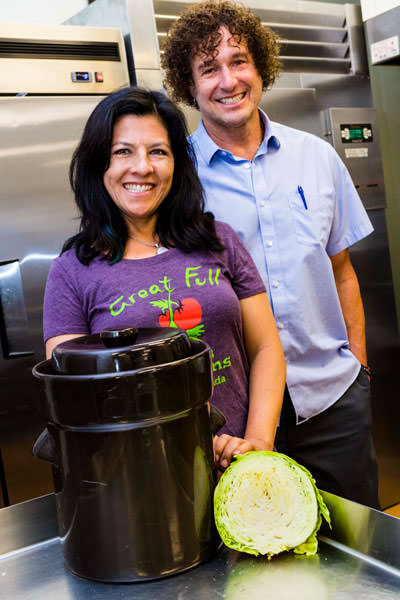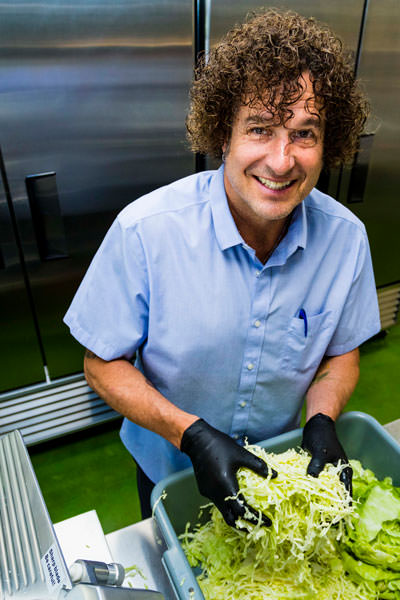Learning the art of fermentation.
Fermented foods and drinks may have been around for hundreds of years, but they also are a growing trend that’s sweeping the nation. As a growing body of research demonstrates, they promote physical and emotional health and essentially help people feel better and more vibrant.
How fermentation works
In the lactic acid fermentation process, the bacteria eat the carbohydrates — the sugars and starches that our bodies cannot digest — and convert them to lactic acid. This lactic acid naturally preserves the food, extending its shelf life and enhancing flavor. Unpasteurized, fermented foods contain live micro-organisms, also known as live cultures, active cultures, or probiotics, which can reportedly lead to better digestion; weight loss; improved immunity; clear skin; dental health; prevention against leaky gut or auto-immune disorders; improved brain and mood function; and the production of vitamins B and B12, thiamine, riboflavin, and vitamin K.
Each person has a unique network of microbiota, an ecological community of micro-organisms with which we are born. This community, called a microbiome, lives on our skin and throughout our digestive tract. Until recently, we didn’t understand this cooperation we have with microbes. Scientists have recently discovered that the health of our microbiota determines our overall health.
“Food, chemicals, drugs, and environmental factors have an effect on an individual’s microbiome,” explains Kathryn Lukas, Reno resident and founder of Farmhouse Culture, the California-based producer of fermented foods, and co-author of The Farmhouse Culture Guide to Fermenting (see Q&A). “Michael Pollan used the term ‘superorganism’ to describe the human body, which really resonated for me because, as we know, all organisms are constantly evolving and adapting to their environment.”
Happy gut, happy life
These microbes are estimated to exceed 100 trillion in the human body. Experts say that the majority of our body’s microbiota are located in our gut, making it an important center that determines our physical, mental, and emotional health.
“Essentially, the gut is our second brain,” says Kirsten Shockey, co-author of three books on fermentation and co-owner of Ferment Works in Southern Oregon. “The research pointing to mood, happiness, and wellness stemming from the gut is overwhelming. There is more truth than we realize to the statement, ‘trust your gut.’ Over the last 150 years, Western culture has assaulted the rich, biodiverse flora of our gut with more and more sterilized foods. Humans co-evolved with microbes processing our foods, and as it turns out, we need them. Fermented foods are not only teeming with live probiotics, but also are more bioavailable, full of fiber — in short, more favorable for your body.”
These foods also are safe and easy to make.
Live foods come directly from nature and include fruits and vegetables, nuts and seeds, fish, poultry, and whole grains. Fermented living foods are rich in inflammation-fighting antioxidants and phytochemicals. They help the body produce and activate enzymes, which are necessary for hormone production and chemical reactions in the body. Fermented foods are alive and rich in probiotics that help promote the healthy bacteria in your body, which are your immune system’s first line of defense. Alive foods are fresher and taste better because they often grow in the most nutrient-dense and mineral-rich soil.

Cyndi Wallis and Gino Scala, co-owners of The Kitchen by Great Full Gardens (and all the Great Full Gardens locations), prepare sauerkraut in a fermentation crock
Back to the beginning
Organic farmers and fermenters understand that healthy, biodiverse soil is the key to healthy crops. They pay special attention to the terroir, the set of environmental factors that can affect crops.
“The soil, climate, and farmers’ practices all contribute elements that can affect the outcome of a given fermented product,” explains Shane Peterson, who co-authored The Farmhouse Culture Guide to Fermenting with his mother, Lukas. “The natural microflora present on the skins and leaves of vegetables and fruits — mainly lactic acid bacteria and yeast — is the catalyst for wild fermentation, so the microbial terroir of a given piece of land and the microflora it contributes to the produce is highly impactful over the process. Produce grown in healthy, biodiverse soils amended with compost will have a rich biodiversity of microflora present on the skins and leaves. Compost could be considered a form of fermentation, and soils amended with it are alive and full of microbes.”
In this way, farming is an art and a science. For the farmer and even the fermenter, there exists a deeply felt symbiotic relationship with the soil and its microflora that leads to fertile land, robust crops, and healthy foods. Cyndi Wallis, co-owner of The Kitchen by Great Full Gardens in Reno (and all the Great Full Gardens locations), says that love and intention are part of the process of making her restaurant’s sauerkraut, which they serve at all Great Full Gardens locations.
“We love hearing the bubbling and gurgling of the sauerkraut as it ferments to create a delicious dish that makes us healthy,” Wallis says. “We are dedicated to providing live foods and have recently added to our menu of dishes that are rich in active cultures and probiotics. I am thrilled with the metaphor that healthy food relies upon an active culture, which in turn builds a healthy community. In fact, we buy FOLK Brewing Co. kombucha primarily because its recipes are adapted to what the local farms are yielding. That’s why its kombuchas are so delicious.”
Brett Kendall, co-owner of FOLK Brewing Co. in Zephyr Cove, enjoys working intentionally with the earth’s bounty to create FOLK’s delicious, naturally effervescent, fermented kombucha.
“We have eight always-on-tap flavors, but we also have 10 seasonal flavors in order to feature ingredients that are growing in season at different times throughout the year,” Kendall says. “For instance, we will offer our Asian pear kombucha in fall. The result is an authentic, living beverage that harmonizes with what our bodies naturally crave at any particular time of year.”
Jamie Della is the author of nine books that focus on seasonal lifestyle, plant ecology, and earth-based wisdom.
RESOURCES
FermentWorks is an educational company that teaches people all over the world. It offers a free e-course to get you started: Ferment.works/free-fermentation-ecourse
Farmhouse Culture’s website provides information about purchasing products and ways to use fermented foods, and it offers an in-depth FAQ section that deals with the importance of gut health: Farmhouseculture.com
The Kitchen by Great Full Gardens
5220 Longley Lane, Ste. 100, Reno
775-384-6420 ï Greatfullgardens.com
FOLK Brewing Co. kombucha is on tap at 35 restaurants, pubs, and shops throughout the Reno-Tahoe area: Folkbrewing.com/find-folk


